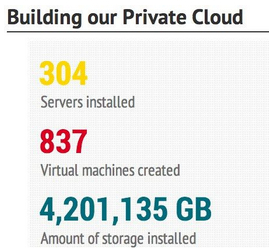 Amazon Web Services has allowed countless startup companies to ramp up back-end infrastructure quickly and cost effectively. But, at a point, at least for some companies, AWS becomes too clunky and … too expensive.
Amazon Web Services has allowed countless startup companies to ramp up back-end infrastructure quickly and cost effectively. But, at a point, at least for some companies, AWS becomes too clunky and … too expensive.
That’s what happened to Moz, the fast-growing Seattle maker of marketing software. In a blog post, newly-appointed CEO Sarah Bird explained why they dumped Amazon for their own private cloud.
“We create a lot of our own data at Moz, and it takes a lot of computing power,” wrote Bird. “Over the years, we’ve spent many small fortunes at Amazon Web Services. It was killing our margins and adding to product instability. Adding insult to injury, we’ve found the service… lacking.”

That’s hardly a ringing endorsement for the big dog of cloud computing, but it is a story that we are increasingly hearing.
Building a private cloud does come with its own risks and challenges. Moz, for example, spent $4 million in lease obligations setting up data centers in Virginia, Washington and Texas in 2012 and 2013. That’s a big upfront cost that a lot of companies can’t stomach, but over time Bird said it paid off and is far cheaper than Amazon.
“On a cash basis, we spent $6.2 million at Amazon Web Services, and a mere $2.8 million on our own data centers. The business impact is profound. We’re spending less and have improved reliability and efficiency,” she wrote.
The company also is hoping that the switch away from AWS will help it swing to profitability. Moz lost $5.7 million in what Bird described in the year-end blog post as a disappointing year in which they burned more cash than they hoped.
“Our gross profit margin had eroded to ~64%, and as of December, it’s approaching 74%. We’re shooting for 80+%, and I know we’ll get there in 2014,” said Bird, adding that the 134-person company plans to swing back to profitability in the third quarter.

At events last November in Seattle, panelists echoed some of the concerns that Bird encountered with AWS.
“I’ve looked at doing other businesses purely in AWS, and if you are not ready to be able to spin up and spin down, it is probably not as cost effective as doing it yourself,” said Joe Specht, senior director of system infrastructure at Tableau Software.
Eamon Gavin, director of network and data center operations at AllRecipes.com, also offered a similar note of caution about the economics of AWS.
“The cloud is attractive because I can spin up my Web site in four hours. Well, great, after 30 days you’ve cost me $1 million because of the traffic and the bandwidth that’s coming into that cloud environment because you didn’t understand,” Gavin said. “We see that all around town, people who have deployed Amazon, and they are like holy s—: ‘I’ve got to bring this all back in house, because we can’t afford this.’”
UPDATE: Moz CTO Anthony Skinner tells us that they have not completely abandoned AWS, with as many as 2,000 servers on the public cloud. “We plan to leave that there,” said Skinner, who expects to spend as much as $1 million with AWS this year. We have asked him for more details, and we’ll update when we hear back.
Meanwhile, here is what he posted to Hacker News.
To be clear, we haven’t dumped AWS for short running stateless processing. We dynamically spin up spot instances as needed for all our stateless processing using AWS and other cloud services. At our current size our AWS bill will not be 7 million but closer to 500k-1 million a year. Not exactly pocket change. Some of the cost savings we are realizing is due to working with AWS as well on best practices.
For our longer stateful processing or apps that need to be available 24/7 with no variability in load we have purchased our own hardware (a process that has been going on for over 18 months). Owning the equipment plus the data center will run us approx 1.2 million including growth to build a hot back up.
It should be noted, staffing cost was not a factor. We must have staff to manage 1000s of servers at AWS or at our own data centers. The biggest factor was paying for compute on boxes that crashed and yielded nothing we could use to move our business forward. Well, I take that back, we got really good at check points and rollbacks. Other than that, not much.
No matter how you slice it, AWS and other cloud services are a great service for the right types of processing, and applications.
Previously on GeekWire: Public cloud vs. private cloud: The debate continues… Moz disappointed with $5.7M loss in 2013: ‘We knew we were going to burn’





